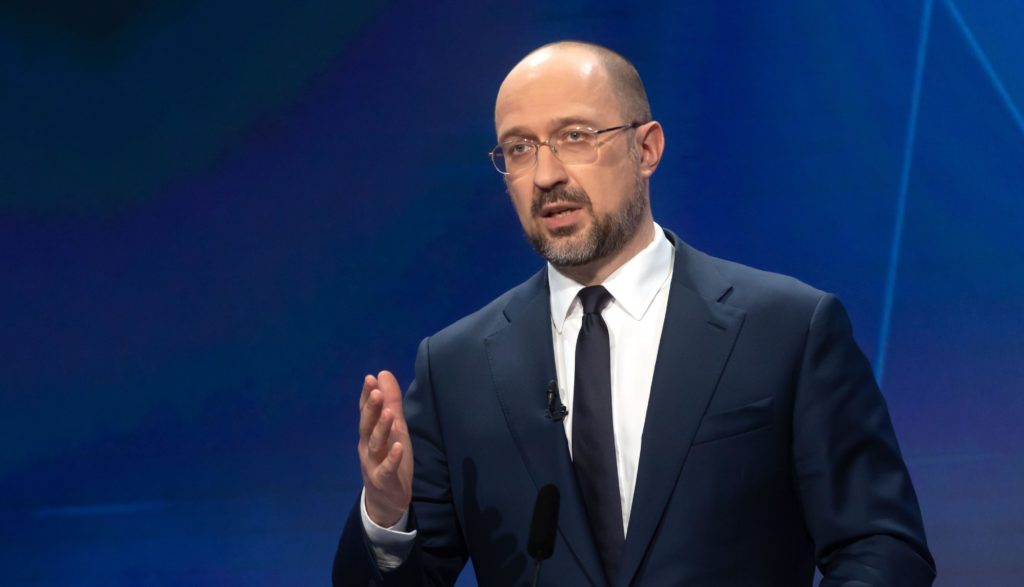KYIV
Prime Minister Denys Shmyhal said Ukraine expected to receive a new $750 million tranche from a stalled International Monetary Fund credit arrangement by the end of the year following a new Fund mission to iron out remaining differences.
Shmyhal told journalists the government had met all the requirements for the resumption of the loan programme – held in abeyance over IMF misgivings on central bank independence, judicial reform and corporate governance. A further 600 million euro loan from the European Union, he said, would also be disbursed in the coming months.
“This mission will be the last one in preparation for disbursing the next tranche,” Shmyhal said, referring to a mission to be held online starting this week because of COVID restrictions.
”We have fulfilled all the conditions, all the benchmarks that were set down. Roughly at the end of November, beginning of December – this is when the IMF tranche will be possible. We do not anticipate an unsuccessful mission as we have met all the benchmark indicators.”
The IMF agreed a $5 billion standby arrangement with Ukraine in June 2020 and an initial tranche of $2.1 billion was rapidly disbursed. But subsequent tranches were held up by the Fund’s insistence on guarantees for central bank independence and on the creation of institutions to overhaul a judicial system widely seen as corrupt.
Ukrainian officials over the past six months had expressed optimism that credits would be resumed – preferably by autumn when external debt payments were due.
The IMF said it would restart its review mission in September, but gave no specific date.
GROUNDS FOR OPTIMISM
Pavlo Kukhta, an academic at the Kyiv School of Economics and a former acting Minister of Economic Development, said the government now had grounds for optimism on the resumption of the credits.
“The IMF representatives will examine the extent to which Ukraine has moved forward as a whole, the extent to which Ukraine needs the money and the length of time since the credits were disbursed,” he told Espreso TV.
“This has been going on for nearly 18 months and it’s unusual not to receive a single credit. I believe there is good reason to be optimistic. But there can be no guarantees.”
Long discussions with central bank officials produced what the bank said were guarantees for its independence – a year after its governor was forced out over what he said was political pressure. The bank last week raised interest rates for the fourth time this year to tackle double-digit inflation, a move also intended to act as a reassurance that it was fully independent in its actions.
CONCERNS OVER CENTRAL BANK, JUDICIARY
Months of debate culminated in parliament approving key legislation on the composition of a 16-member High Qualification Commission of Judges, which selects and evaluates justices. Foreign experts are to be included on a High Council of Justice to oversee judicial appointments.
A separate body, the Council of Judges, the Ukrainian judiciary’s highest body, ensures the independence of judges and was until recent changes, elected by secret ballot.
U.S. officials had also criticised what they saw as interference in the corporate governance of state-run corporations, citing the removal by the cabinet order of oil and gas concern Naftogaz.
The EU had also made the second 600-million euro tranche of a loan contingent on those judicial reforms and meeting IMF criteria. It extended the first 600 million euro tranche of a loan last December to help ensure macroeconomic stability amid the COVID pandemic.
President Volodymyr Zelensky had suggested the IMF was treating Ukraine unfairly because it was taking no account of seven years of conflict pitting the army against Russian proxies occupying large tracts of land in the eastern Donbas region.
Ukrainian officials this week also met Anna Bjerde, World Bank Vice President for Europe and Central Asia, to discuss new credits and cooperation with the IMF.

